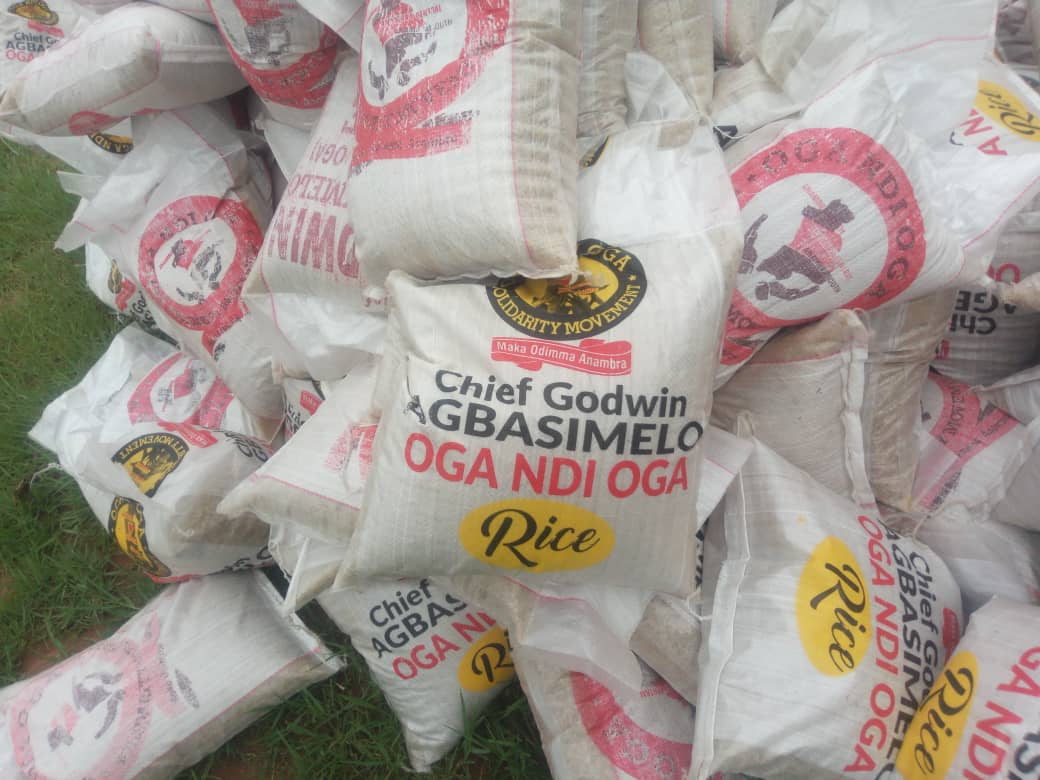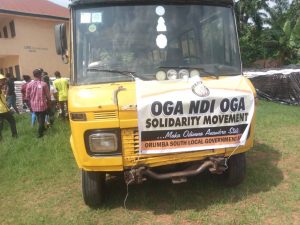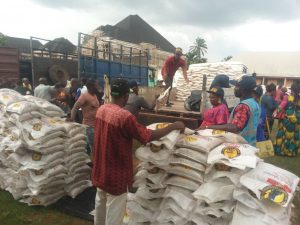Featured
Residents Of 18 LGAs In Anambra State Benefit Relief Materials From Chief Agbasimelo

Joel Ajayi
The quest of Chief Eloka Godwin Agbasimelo, the founder of the Oga ndi Oga Foundation to reduce the burden of people of Anambra state has continue to wax stronger day by day, as Residents of 18 Local Government Areas out of 21 recieved the food items to cushion effect of COVID-19 in the state.


While many Nigerians in other states were seen scrampling to adjust in an attempt to reduce unprecedented impact of Pandemic Covid-19, Anambra indegenes, home and abroad, were seen smiling courtesy of the kind hearted Chief Agbasimelo.
The gesture which was put in place by him in the 18 LGAs, owing to the relief materials distributed, were packages of 70,000 Ten kilogram bags of rice, among other food items.
.
The representatives of the different local government came to receive their own in the Chairman’s home town Ezinifite in Nnewi South LGA, Anambra state.
Distributing the food items, the Coordinator of Oga ndi Oga foundation, Chief Engr Echezona Uzoka was on ground to distribute the items in line with what the Chairman of Oga ndi Oga Foundation and Goddosky International FC Chief Eloka Godwin Agbasimelo has been doing to touch the lives of the people living in Anambra state and outside the state.


According to the coordinator, the Chairman will continue to help people as it is a commitment he has decided to see to the end.
It’s on record that Chief Agbasimelo, a philanthropist, has been using his resources to help the needy.
Just few days ago, Anambrans in their numbers in Lagos recieved the support of the benevolent Chief, with different food items to help people who cannot go out to source for their daily meals, as the lockdown is taking a toll on millions of people in the country.
It doesn’t end there, recently, Chief Agbasimelo gave out hundreds of ladies motorcycles to individual women of different local government to enable the traders who find it difficult getting to the place of their trade in neighbouring towns in Anambra state.
Featured
NELFUND: The Renewed Hope Engine Propelling Nigeria’s Youth into Tomorrow

By Dayo Israel, National Youth Leader, APC
As the National Youth Leader of the All Progressives Congress, I have spent most of my tenure fighting for a Nigeria where every young person, regardless of their ward or local government, family income, or circumstance, can chase dreams without the chains of financial despair.
Today, that fight feels like victory, thanks to the Nigerian Education Loan Fund (NELFUND). Launched as a cornerstone of President Bola Ahmed Tinubu’s Renewed Hope Agenda, this initiative isn’t just a policy tweak; it’s a revolution. And under the steady, visionary hand of Managing Director Akintunde Sawyerr, NELFUND has transformed from a bold promise into a roaring engine of opportunity, disbursing over ₦116 billion to more than 396,000 students and shattering barriers for over a million applicants.
Let’s be clear: NELFUND was always destined to be a game-changer. Signed into law by President Tinubu on April 3, 2024, it repealed the outdated 2023 Student Loan Act, replacing it with a modern, inclusive framework that covers tuition, upkeep allowances, and even vocational training—ensuring no Nigerian youth is left on the sidelines of progress.
But what elevates it from groundbreaking to generational? Leadership. Enter Akintunde Sawyerr, the diplomat-turned-executioner whose career reads like a blueprint for results-driven governance. From co-founding the Agricultural Fresh Produce Growers and Exporters Association of Nigeria (AFGEAN) in 2012—backed by icons like former President Olusegun Obasanjo and Dr. Akinwumi Adesina—to steering global logistics at DHL across 21 countries, Sawyerr brings a rare alchemy: strategic foresight fused with unyielding accountability.
As NELFUND’s pioneer MD, he’s turned a fledgling fund into a finely tuned machine, processing over 1 million applications since May 2024 and disbursing ₦116 billion—₦61.33 billion in institutional fees and ₦46.35 billion in upkeep—to students in 231 tertiary institutions nationwide. That’s not bureaucracy; that’s brilliance.
Sawyerr’s touch is everywhere in NELFUND’s ascent. Since the portal’s launch, he’s overseen a digital ecosystem that’s as transparent as it is efficient—seamless verification, BVN-linked tracking, and real-time dashboards that have quashed misinformation and built trust. In just 18 months, the fund has empowered 396,252 students with interest-free loans, many first-generation learners who might otherwise have dropped out.
Sensitization drives in places like Ekiti and Ogun have spiked applications — 12,000 in a single day in one instance, while expansions to vocational centers in Enugu pilot the next wave of skills-based funding. And amid challenges like data mismatches and fee hikes, Sawyerr’s team has iterated relentlessly: aligning disbursements with academic calendars, resuming backlogged upkeep payments for over 3,600 students, and even probing institutional compliance to safeguard every kobo. This isn’t management; it’s mastery—a man who doesn’t just lead but launches futures.
Yet, none of this happens in a vacuum. President Tinubu’s alliance with trailblazers like Sawyerr is the secret sauce securing Nigeria’s tomorrow. The President’s Renewed Hope Agenda isn’t rhetoric; it’s resources—₦100 billion seed capital channeled into a system that prioritizes equity over elitism. Together, they’ve forged a partnership where vision meets velocity: Tinubu’s bold repeal of barriers meets Sawyerr’s boots-on-the-ground execution, turning abstract policy into tangible triumphs. It’s a synergy that’s non-discriminatory by design—Christians, Muslims, every tribe and tongue united in access—fostering national cohesion through classrooms, not courtrooms.
As Sawyerr himself notes, this is “visionary leadership” in action, where the President’s political will ignites reforms that ripple across generations.
Why does this matter to us, Nigeria’s youth? Because NELFUND isn’t handing out handouts—it’s handing out horizons. In a country where 53% of us grapple with unemployment, these loans aren’t just funds; they’re fuel for innovation, entrepreneurship, and endurance.
Picture it: A first-generation polytechnic student in Maiduguri, once sidelined by fees, now graduates debt-free (repayments start two years post-NYSC, employer-deducted for ease) and launches a tech startup. Or a vocational trainee in Enugu, equipped with skills funding, revolutionizing local agriculture. This is quality education that endures—not fleeting certificates, but lifelong launchpads. Sawyerr’s focus on human-centered design ensures loans cover not just books, but bread—upkeep stipends of ₦20,000 monthly keeping hunger at bay so minds can soar. Under his watch, NELFUND has debunked doubts, refuted fraud claims, and delivered results that scream sustainability: Over ₦99.5 billion to 510,000 students by September, with 228 institutions on board.
As youth leaders, we see NELFUND for what it is: A covenant with our future. President Tinubu and MD Sawyerr aren’t just allies; they’re architects of an educated, empowered Nigeria—one where poverty’s grip loosens with every approved application, and innovation blooms from every funded desk. This isn’t charity; it’s an investment in the 70 million of us who will lead tomorrow.
We’ve crossed one million applications not because of luck, but leadership—a duo that’s turning “access denied” into “future unlocked.”
To President Tinubu: Thank you for daring to dream big and backing it with action.
To Akintunde Sawyerr: You’re the executor we needed, proving that one steady hand can steady a nation.
And to every Nigerian youth: Apply. Graduate. Conquer.
Because with NELFUND, your generation isn’t just surviving—it’s thriving, enduring, and eternal.
The Renewed Hope isn’t a slogan; it’s our story, now written in scholarships and success. Let’s keep turning the page.
Dayo Israel is the National Youth Leader of the All Progressives Congress (APC).
-

 Featured6 years ago
Featured6 years agoLampard Names New Chelsea Manager
-

 Featured6 years ago
Featured6 years agoFG To Extends Lockdown In FCT, Lagos Ogun states For 7days
-

 Featured6 years ago
Featured6 years agoChildren Custody: Court Adjourns Mike Ezuruonye, Wife’s Case To April 7
-

 Featured6 years ago
Featured6 years agoNYSC Dismisses Report Of DG’s Plan To Islamize Benue Orientation Camp
-

 Featured4 years ago
Featured4 years agoTransfer Saga: How Mikel Obi Refused to compensate me After I Linked Him Worth $4m Deal In Kuwait SC – Okafor
-
Sports3 years ago
TINUBU LAMBAST DELE MOMODU
-

 News11 months ago
News11 months agoZulu to Super Eagles B team, President Tinubu is happy with you
-
Featured6 years ago
Board urges FG to establish one-stop rehabilitation centres in 6 geopolitical zones

1 Comment